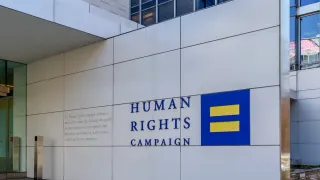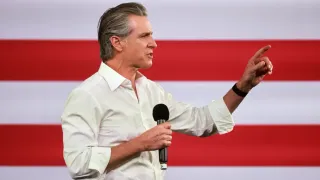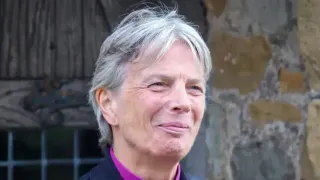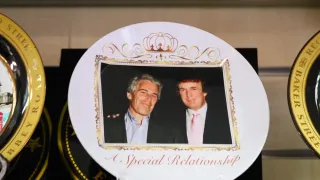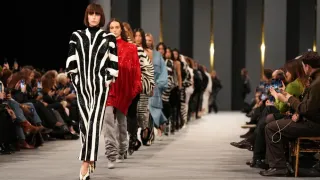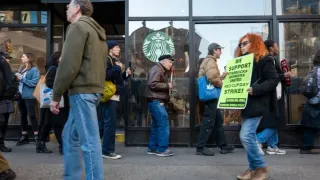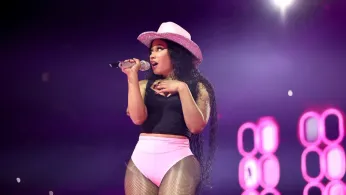
5 hours ago
Nicki Minaj, MAGA, and the Barbz: When Pop Collides With Politics—And Trans Lives Are on the Line
READ TIME: 4 MIN.
It was the TikTok remix no one in queer America asked for: in early November, the official White House account posted a video set to Nicki Minaj’s “Va Va Voom”—but instead of a playful, Barbz-approved dance, the soundtrack accompanied a list of Donald Trump’s second-term “achievements” that included direct attacks on transgender people’s rights, from school bathroom bans to barring trans women from sports teams.
Minaj, arguably one of the most influential rappers of her generation and a long-standing favorite of LGBTQ+ fans, responded by sharing the White House video on her own TikTok, amplifying the message and setting off a cultural earthquake across fandoms and activist circles. Suddenly, the artist who once rapped about “freedom” and whose Barbz army is famous for its queer energy, was cheering on a political platform that makes life harder—and more dangerous—for transgender people.
For many LGBTQ+ listeners, the rupture was personal. Trump’s second term has been marked by a series of executive orders targeting trans youth and adults alike: banning trans students from using bathrooms that match their gender identity, and barring trans girls and women from participating in sports under the guise of “protecting Title IX”. These measures have not only been condemned by civil rights groups, but have contributed to a nationwide spike in anti-trans rhetoric and violence.
The White House’s TikTok post, now made viral by Minaj herself, listed these policies as victories. For trans and queer fans, the message was chilling: the music that once blared at Pride parties and drag shows was now the soundtrack for their erasure.
The response was swift. Social media lit up with heartbreak, anger, and calls for accountability. As one fan commented, “We made Nicki an icon, but she’s forgotten who kept her crown polished.” The sense of betrayal was palpable, especially among transgender Barbz, who have often found solace and strength in Minaj’s bold, unapologetic persona.
This isn’t Minaj’s first rightward swerve in recent weeks. Days before the TikTok controversy, she shared a screenshot of a Truth Social post in which Trump declared, “Christianity is facing an existential threat in Nigeria,” and made Nigeria a “COUNTRY OF PARTICULAR CONCERN.” Minaj gushed in response, “Thank you to The President & his team for taking this seriously”. The right wing, always eager for a celebrity endorsement, immediately embraced her. Even U.S. ambassador Mike Waltz invited Minaj to the United Nations, to which she replied she’d be “honored.” She then boasted about making history as the “first female rapper to receive an invitation to the United Nations,” rallying her Barbz with, “Come on Barbz, let’s make America gag again”.
For queer fans, the irony was sharp: Minaj—once a symbol of defiant, rainbow-hued rebellion—was now echoing MAGA slogans and amplifying policies that target the very existence of transgender Americans.
For many, the rupture raises an uncomfortable question: What happens when pop stars cross lines that threaten their queer audiences? The Barbz, a fandom famous for both their devotion and their diversity, have long included transgender people, drag artists, and LGBTQ+ youth who found community in Minaj’s music and persona. Now, some are asking whether the cost of stardom is too high if it means cheering on those in power as they roll back rights.
As Erin Reed, a prominent trans journalist, wrote recently, “If people truly understood how this machine operates—how far-right strategists deliberately engineered fear and misinformation toward the goal of creating a Christian nationalist state—they might recognize that the threat isn’t trans people at all”. While Minaj may be “just goin w|the flow,” as she posted in response to the White House’s TikTok, the stakes for trans people are a matter of survival and dignity, not just vibes.
There is a bitter sadness to seeing a queer-adored icon align herself with a movement that frames transgender people as threats. For many, pop music isn’t just entertainment; it’s armor, it’s family, it’s a lifeline. “Being trans—the act of transitioning and living authentically—is not a special interest or a social experiment. It is freedom of expression. It is liberty. It is the pursuit of happiness. And any attack on those rights for trans people signals the erosion of those rights for all Americans”.
Yet, out of the disappointment and anger, new forms of resistance are rising. Trans and queer fans are turning to each other, uplifting local artists, and refocusing on community-led advocacy. The message is clear: icons may falter, but the community’s power is unbreakable.
Pop stars have always been lightning rods for cultural battles, and their alliances matter. For LGBTQ+ people, especially those who are trans, the question isn’t whether fandoms can survive disappointment—it’s whether communities can continue to find joy and belonging in spaces that feel unsafe or hostile.
As the dust settles, one thing is certain: The fight for trans rights and dignity will continue, with or without the backing of pop royalty. And in the words of one fan, “Our love and our pride are bigger than any one celebrity’s endorsement. The Barbz will keep gagging, but we’ll also keep fighting—because our lives depend on it.”
